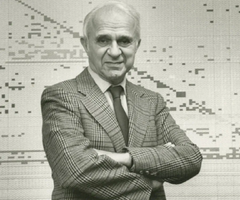More languages
More actions
This article cites no sources and was directly copied from Wikipedia. Do not take the information presented here uncritically |
Wassily Leontief | |
|---|---|
 | |
| Born | Vasily Vasilyevich Leontiev August 5, 1905 Munich, German Empire |
| Died | February 5, 1999 (aged 93) New York City, U.S. |
| Nationality | Soviet, Russian, American |
Wassily Wassilyevich Leontief (Russian: Васи́лий Васи́льевич Лео́нтьев; August 5, 1905 – February 5, 1999), was a Soviet-Statesian economist known for his research on input–output analysis and how changes in one economic sector may affect other sectors.
Leontief won the Nobel Memorial Prize in Economic Sciences in 1973, and four of his doctoral students have also been awarded the prize (Paul Samuelson 1970, Robert Solow 1987, Vernon L. Smith 2002, Thomas Schelling 2005).
Major contributions[edit | edit source]
Leontief is credited with developing early contributions to input–output analysis and earned the Nobel Prize in Economics for his development of its associated theory. He has also made contributions in other areas of economics, such as international trade where he documented the Leontief paradox. He was also one of the first to establish the composite commodity theorem.
Leontief earned the Nobel Prize in economics for his work on input–output tables. Input–output tables analyze the process by which inputs from one industry produce outputs for consumption or for inputs for another industry. With the input–output table, one can estimate the change in demand for inputs resulting from a change in production of the final good. The analysis assumes that input proportions are fixed; thus the use of input–output analysis is limited to rough approximations rather than prediction. Input–output was novel and inspired large-scale empirical work; in 2010 its iterative method was recognized as an early intellectual precursor to Google's PageRank.
Leontief used input–output analysis to study the characteristics of trade flow between the U.S. and other countries, and found what has been named Leontief's paradox; "this country resorts to foreign trade in order to economize its capital and dispose of its surplus labor, rather than vice versa", i.e., U.S. exports were relatively labor-intensive when compared to U.S. imports. This is the opposite of what one would expect, considering the fact that the U.S.'s comparative advantage was in capital-intensive goods. According to some economists, this paradox has since been explained as due to the fact that when a country produces "more than two goods, the abundance of capital relative to labor does not imply that the capital intensity of its exports should exceed that of imports."
Leontief was also a very strong proponent of the use of quantitative data in the study of economics. Throughout his life Leontief campaigned against "theoretical assumptions and non-observed facts". According to Leontief, too many economists were reluctant to "get their hands dirty" by working with raw empirical facts. To that end, Wassily Leontief did much to make quantitative data more accessible, and more indispensable, to the study of economics.
Publications[edit | edit source]
- 1925: Баланс народного хозяйства СССР. ("Balans narodnogo khozyaystva SSSR") in Planovoe Khozyaystvo [ru]; translated into Italian in Spulber N.(Ed.) as "Il Bilancio dell'economia nazionale dell'URSS." in La Strategia Sovietica per Sviluppo Economico 1924–1930, Giulio Einaudi ed., Torino [discussing the Soviet "Balance of the National Economy", 1923–4]
- 1928: Die Wirtschaft als Kreislauf, Tübingen: Mohr: re-published as The economy as a circular flow, pp. 181–212 in: Structural Change and Economic Dynamics, Volume 2, Issue 1, June 1991; this translation is abridged to avoid controversial statements.
- 1941: Structure of the American Economy, 1919–1929
- 1953: Studies in the Structure of the American Economy
- 1966: Input-Output Economics
- 1966: Essays in Economics
- 1977: Essays in Economics, II
- 1977: The Future of the World Economy
- 1983: Military Spending: Facts and Figures, Worldwide Implications and Future Outlook co-authed with F. Duchin.
- 1983: The Future of Non-Fuel Minerals in the U. S. And World Economy co-authed with J. Koo, S. Nasar and I. Sohn
- 1986: The Future Impact of Automation on Workers co-authored with F. Duchin
Awards[edit | edit source]
- 1953: Order of the Cherubim, University of Pisa
- 1962: Dr honoris causa, University of Brussels
- 1967: Dr of the University, University of York
- 1968: Officer of the French Légion d'honneur
- 1970: Bernhard-Harms Prize Economics, West Germany
- 1971: Dr honoris causa, University of Louvain
- 1972: Dr honoris causa, University of Paris (Sorbonne)
- 1973: Bank of Sweden Prize in Economic Sciences in Memory of Alfred Nobel, a.k.a. Nobel Prize in Economics
- 1976: Dr honoris causa, University of Pennsylvania
- 1980: Dr honoris causa, University of Toulouse, France
- 1980: Dr honoris causa, University of Louisville, Kentucky
- 1980: Doctor of Social Sciences, University of Vermont
- 1980: Doctor of Laws, C. W. Post Center, Long Island University
- 1980: Russian-American Hall of Fame
- 1981: Karl Marx University, Budapest, Hungary
- 1984: Order of the Rising Sun, Japan
- 1985: Commandeur, French Order of Arts and Letters
- 1988: Dr honoris causa, Adelphi College
- 1988: Foreign member, USSR Academy of Sciences
- 1989: Society of the Optimate, Italian Cultural Institute, New York
- 1990: Dr honoris causa, University of Córdoba, Spain
- 1991: Takemi Memorial Award, Institute of Seizon & Life Sciences, Japan
- 1995: Harry Edmonds Award for Life Achievement, International House, New York
- 1995: Dr honoris causa, Humboldt University, Berlin, Germany
- Award of Excellence, The International Center in New York
